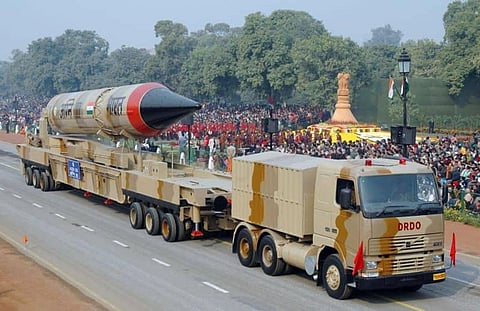
- Home
- NG Hindi
- India
- World
- Politics
- Sex & Relationships
- Entertainment
- Culture
- Lifestyle
- Economy
- Sports
- Sp. Coverage
- Misc.
- NewsGram Exclusive
- Jobs / Internships

By NewsGram Staff Writer
Underlining its determination to have indigenous defence production as a cornerstone of its 'Make in India' drive, the Narendra Modi government has awarded a record 56 defence manufacturing permits to private sector entities in the past year.
According to the data released by the Department of Industrial Policy and Promotion (DIPP), a slew of applications, some of which had been pending for more than four years, have been cleared since the BJP government came to power.
The permits are the first step in the process to enable firms such as Mahindra, Tata and Pipavav to set up production units for major military equipment.
The Tatas will now be able to upgrade major fighting units like the T 90 and T 72 tanks of the Indian Army while Mahindra has been given permits in a number of areas, including manufacturing naval systems like torpedoes, sea mines and boats.
Subsidiary companies like Mahindra Telephonics Integrated Systems and Tech Mahindra Ltd too have got defence permits.
The move stands as a major endorsement of the Indian private sector's ability to operate in an arena that has until now been the preserve of foreign vendors and state-run entities.
Besides the established players, a number of new small firms are poised to enter the sector based on these clearances.
For example, Bullet Proof equipment manufacturer MKU will now be able to manufacture night vision devices while Bangalore-based Dynamatic Technologies has been granted a permit to manufacture Unmanned Aerial Vehicles.
Pipavav Defence and Offshore Engineering Company (PDOC), now being acquired by the Anil Ambani-run Reliance, has grabbed four permits to manufacture items ranging from medium tanks and howitzers to missiles, sensors and torpedoes.
In order to open up the defense sector, the government has started expediting clearances besides increasing the foreign investment limit for the defence sector to 49% and even up to 100% in select cases.
The process for application online and the validity of the Industrial license has been enhanced to seven years and speedy DIPP clearances are already being given for smaller items like components.
Complex matters such as the offset policy, blacklisting process as well as a specific route for the Make in India process are expected to be simplified through a new defence procurement policy, likely to be announced in the coming few weeks.
